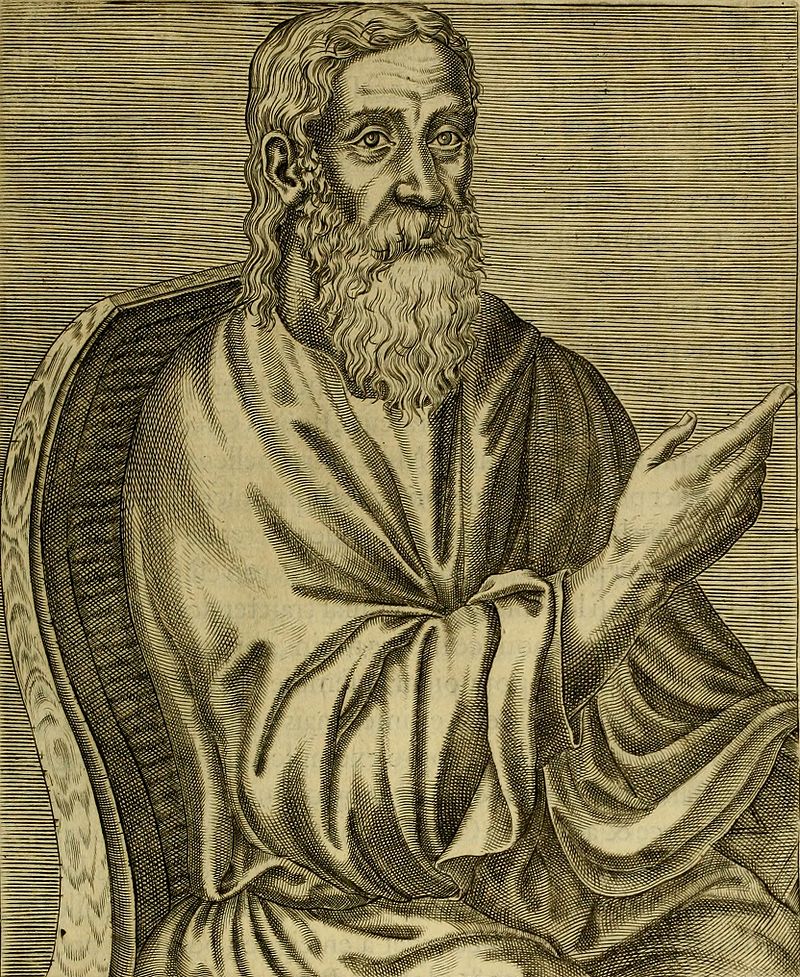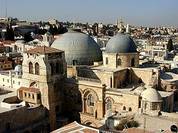St. Clement of Alexandria (150-216 A.D.)
Titus Flavius Clemens, St. Clement of Alexandria was probably born a pagan in Athens about 150 A.D. He was one of the first great leaders in Christian Africa. After his conversion, he traveled to Italy, Syria and Palestine seeking Christian teachers. He met a most impressive one by the name of Pantaenus in Alexandria, became his pupil, associate and succeeded him as the head of a school for catechumens (converts) by 200 A.D.
He speaks of the apostolic tradition he received his teachers. He had no doubt, known some who recalled Ignatius and Polycarp or perhaps, even some who as children had heard St. John speak of our Lord's commands. He could claim to be in the next succession after the apostles.
Principal works comprise a trilogy focused upon Christ and this threefold relationship with the believer. He converts the heart/mind, disciplines and then imparts wisdom. His focus is upon Christ the Incarnate Word, whom he sees at work in the depths of our souls, leading us toward the moment of encounter in His divinizing presence.
He sees all the values the Greeks held dear, in mythology, philosophy and their mystery cults, fulfilled in Christ, who is the true mystagogue and the dispenser of wisdom. He see Christ as the ministrel who gives harmony to the universe and makes music to God. He sees the divine Word as the Sun of Righteousness enlightening the whole world. He urges converts to resist the siren call of pleasure and cling instead to the wood of the Cross in order to be freed from corruption. Cardinal Dulles in his book, A History of Apologetics, says, “he is above all a Christian humanist, who moves easily amid the arts and letters of classical civilization combining Christian piety with the highest values of ancient culture” (p. 41).
He has two quotations in the Catechism of the Catholic Church:
A persecution by Roman Emperor Septimius Severus in about 203 forced him to close the school and flee to Egypt. His writings are the first to discuss the relationship between faith and reason. His great treatises constitute a moral and dogmatic theology as well as an apologetic (defense) of the faith. He died in Cappadocia between 211-215 A.D.
Titus Flavius Clemens, St. Clement of Alexandria was probably born a pagan in Athens about 150 A.D. He was one of the first great leaders in Christian Africa. After his conversion, he traveled to Italy, Syria and Palestine seeking Christian teachers. He met a most impressive one by the name of Pantaenus in Alexandria, became his pupil, associate and succeeded him as the head of a school for catechumens (converts) by 200 A.D.
He speaks of the apostolic tradition he received his teachers. He had no doubt, known some who recalled Ignatius and Polycarp or perhaps, even some who as children had heard St. John speak of our Lord's commands. He could claim to be in the next succession after the apostles.
Principal works comprise a trilogy focused upon Christ and this threefold relationship with the believer. He converts the heart/mind, disciplines and then imparts wisdom. His focus is upon Christ the Incarnate Word, whom he sees at work in the depths of our souls, leading us toward the moment of encounter in His divinizing presence.
He sees all the values the Greeks held dear, in mythology, philosophy and their mystery cults, fulfilled in Christ, who is the true mystagogue and the dispenser of wisdom. He see Christ as the ministrel who gives harmony to the universe and makes music to God. He sees the divine Word as the Sun of Righteousness enlightening the whole world. He urges converts to resist the siren call of pleasure and cling instead to the wood of the Cross in order to be freed from corruption. Cardinal Dulles in his book, A History of Apologetics, says, “he is above all a Christian humanist, who moves easily amid the arts and letters of classical civilization combining Christian piety with the highest values of ancient culture” (p. 41).
He has two quotations in the Catechism of the Catholic Church:
- “Just as God’s will is creation and is called ‘the world,’ so his intention is the salvation of men, and is called ‘the Church.’” (CCC 760)
- Speaking of the principle of the Church’s unity: “What an astonishing mystery! There is one Father of the universe, one Logos of the universe, and also one Holy Spirit, everywhere one and the same; there is also one virgin become mother, and I should like to call her ‘Church.” (CCC 813)
- The Blood of our Lord, indeed is twofold. There is His corporeal Blood, by which we are redeemed from corruption; and His spiritual Blood, that with which we are anointed. That is to say, to drink the Blood of Jesus is to share in His immortality . The strength of the Word is the Spirit, just as the blood is the strength of the body. Similarly, as wine is blended with water, so the Spirit with man. The one, the Watered Wine, nourishes in faith, while the other, the Spirit, leads us on to immortality. The union of both, however,--of the drink and of the Word,--is called the Eucharist, a praiseworthy and excellent gift. Those who partake of it in faith are sanctified in body and in soul. By the will of the Father, the divine mixture, man, is mystically united to the Spirit and the Word.
A persecution by Roman Emperor Septimius Severus in about 203 forced him to close the school and flee to Egypt. His writings are the first to discuss the relationship between faith and reason. His great treatises constitute a moral and dogmatic theology as well as an apologetic (defense) of the faith. He died in Cappadocia between 211-215 A.D.

 RSS Feed
RSS Feed

